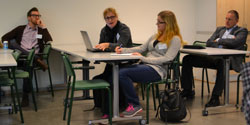
Focus on diversity
The core of the conference is meeting, sharing, discussing, exchanging ideas and thus developing and furthering the research in the field of retail and wholesale. This happens in the presentations of abstracts as well as in the breaks in between. Here are a few of the topics that were brought up.

After lunch on the first day of the Nordic Retail and Wholesale Conference (NRWC) 2012 in November in Lund the presentations of papers and abstracts started. In four parallel tracks in six sessions during the two days of the conference researchers from the Nordic countries presented their research on a variety of topics ranging from inventions, consumer behavior, digital marketing, sustainable retail to supply management and more. Around a hundred abstracts and papers were presented in total that gave rise to lots of interesting discussions.
Sustainability issues
Magnus Frostenson, Uppsala University, and Sven Helin, Örebro University, talked about how retail companies control sustainability in stores.
– We can see that there’s a discrepancy between the corporate management’s experience of control and what the store management thinks, said Magnus. Although sustainability is important at the store level, the management there isn’t aware of being controlled in that respect even though the upper level management reports on controlling these issues.
Also on the subject of sustainability Kristina Tamm Hallström from Stockholm School of Economics/Stockholm Centre for Organizational Research (Score) presented her case about the Swedish Eco-label KRAV.
Kristina is studying the spirals of mistrust regarding Eco-labels and how standards are controlled by certifiers, certifiers are controlled by accreditors and accreditors are controlled by meta-accreditors in a complex fashion that makes it hard for the consumers to grasp the concept.

Coffee break with muffins and discussions.
Restructuring work and integrated supply chains
Rebecka Arman, University of Gothenburg Centre for Retailing, talked about the recently started project on restructuring work in the retail sector.
– Our aim is to create restructuring expertise for retailers and increased knowledge in this matter which will be important for the retailers in the changing future, said Rebecka.
Up next was Trond Bottolfsen from Harstad University College who talked about what integration in the supply chain means for store performance. He concluded that in his case connectivity and collaboration both internally and externally upped the store’s performance.
Virtual store planning and models for prediction
From Aarhus University came Kristian Andreasen who presented himself as a game nerd.
– With ideas from computer games we’ve created a virtual world for planning a new store with people who lives in different parts of the world, said Kristian. This makes it possible to work at different times of the day thus making the collaboration more efficient and easy when you live in different time zones.
In one of the last sessions Meri Malmari, University of Turku, talked about the testing of a model for predicting consumers choice of shopping destination. The test so far show that the model performs rather well, but the prediction power varies with different variables.

Rebecka Arman, Trond Bottolfsen, Kristian Andreasen och Meri Malmari
In conclusion we can see that the research in the retail and wholesale field is vibrant and diverse and that the conference seems to work as a focal point on the area as well as allowing for the varying subjects to be lifted and discussed.